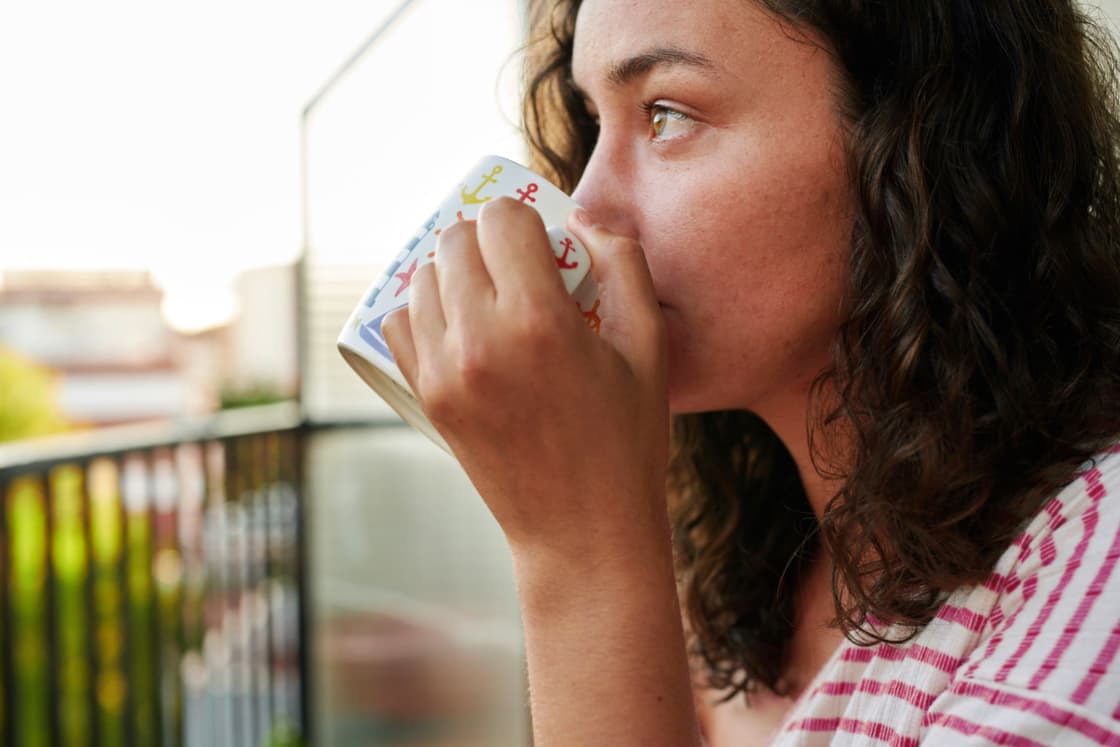By Ellen Vora, M.D.Holistic Psychiatrist
As a holistic psychiatrist practicing in busy New York City, there are two traits nearly all of my patients have in common: anxiety and caffeine consumption.
And for the record, in general, I think that caffeine is safe, common, normal, enjoyable, and even potentially beneficial. I have nothing inherently against it! However, if you happen to suffer from anxiety, panic attacks, OCD, insomnia, or depression, and you consume caffeine, it’s time to recognize that caffeine very likely plays a role in your symptoms.
Why caffeine plays a role in mood issues and sleep disorders.
Caffeine promotes the release of cortisol (the stress hormone), triggering a stress response in the body. For some people, a stress response is synonymous with anxiety and panic, and it can contribute to other unpleasant states, such as mood swings and ruminations.
In terms of insomnia, I hear the same refrain over and over: How could one cup of coffee in the morning affect my sleep at night? We all underestimate how long caffeine lingers in the body. Caffeine has a half-life of five to seven hours for most people. If you don’t remember this concept from high school chemistry, this means it takes about six hours for your body to metabolize half the caffeine, and another six hours to metabolize half of that. So a cup of coffee at 9 a.m. is still lingering in your body at bedtime, and having a cup of coffee at 3 p.m. is effectively like drinking half a cup of coffee at 9 p.m. We wouldn’t do that, but unwittingly, many of us are doing this all the time. Even a little bit of caffeine lingering in the body can disrupt the quality of your sleep.
The caffeine-insomnia connection is a pretty vicious cycle of getting bad sleep → being tired during the day → drinking coffee because you’re tired → having crappy sleep at night because of so much coffee → being tired during the day because of poor sleep quality → and then feeling tempted to get another latte…
Why caffeine is affecting your anxiety more than you think.
If you struggle with anxiety—or anxiety-related conditions like phobias or panic attacks—the connection between caffeine consumption and the way you’re feeling on a daily basis is even more striking. We already know that caffeine promotes the release of cortisol, which is also directly associated with anxiety and chronic stress. Put simply, coffee, tea, soda, and other caffeine-containing products lower the stress threshold and augment your stress response.
What does this mean, exactly? It means that drinking caffeine makes your nervous system eager for a fight at all times. If you introduce a stressor, like public speaking or a troubling email from your boss, before you know it, your heart is pounding, your hands are trembling, your throat is dry, and your whole body feels shaky and faint. Your body might even feel OK, but your mind gets tripped into a ruminative spiral as a result of caffeine and its power to sabotage your ability to cope with stressors and control your fight-or-flight response. When you remove the caffeine, your stress response loses the wind from its sails. As a result, the anxiety response is less likely to happen, and it’s less intense if and when it does happen.
Struggling with your mental health? Try this caffeine challenge.
If I’ve convinced you to give caffeine sobriety a try, please decrease your caffeine consumption gradually. If you go cold turkey, you’ll be in caffeine withdrawal, and you won’t be a happy camper. Instead, go from a few cups of coffee daily to one, then to half-caf, then to black tea, then to green tea. Eventually, you’ll be down to a few sips of green tea, and from there, go caffeine sober. You may still have a few days where you’re getting your bearings, but before you know it, everything will stabilize.
After a week completely off caffeine, check in with yourself. How’s your anxiety? Any recent panic attacks? How’s your mood? Your sleep? Keep taking stock of your symptoms, and get intimately acquainted with the relationship between your symptoms and caffeine. Open your eyes to the role this powerful substance plays in symptoms you thought were just who you are. If anxiety or insomnia, depression, OCD, or any other issue has plagued you for years, I hope caffeine sobriety helps you achieve a lasting state of better well-being. It may not be a complete “cure,” but it will likely be a step in the right direction.

